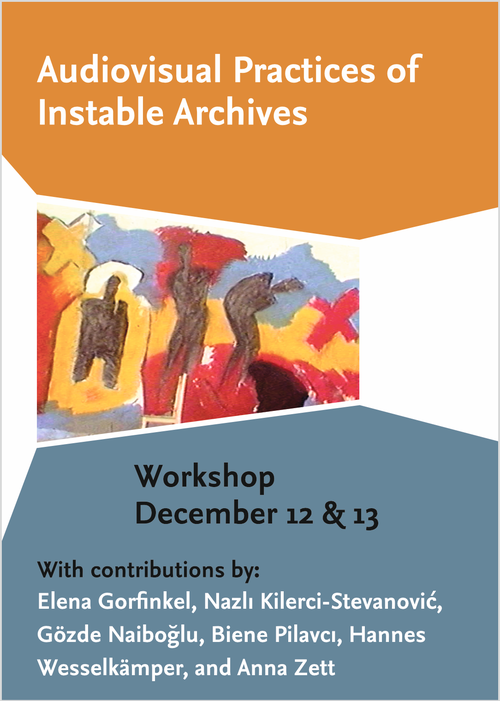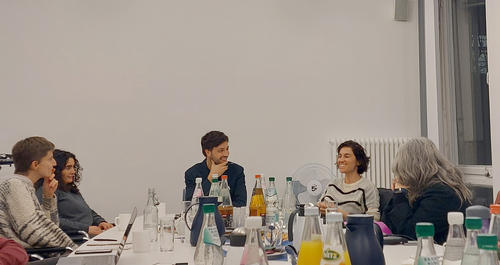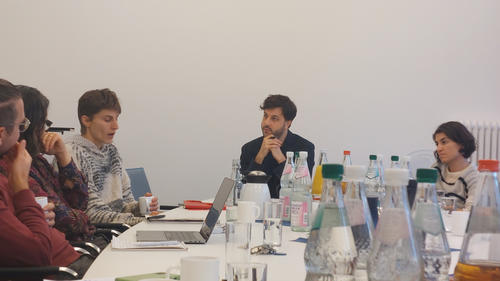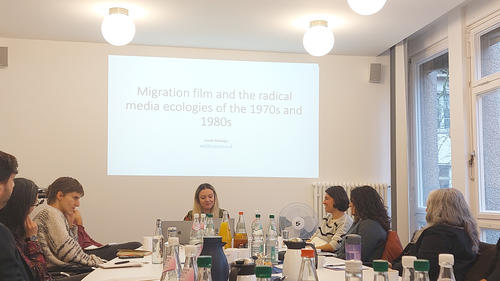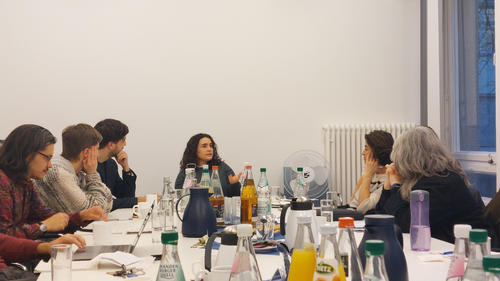Audiovisual Practices of Instable Archives
12. & 13.12.2023 | Workshop by the Cinepoetics group with Elena Gorfinkel, Nazlı Kilerci-Stevanović, Gözde Naiboğlu, Biene Pilavcı, Hannes Wesselkämper, and Anna Zett
Jan 05, 2024
Research Focus: Historical Phenomenology
The workshop started with short introductory remarks by Nazlı Kilerci-Stevanović and Hannes Wesselkämper examining different modes of stability of embodied archival practices of the past and present. Following these processes might lead away from strong distinctions between institutional archives and other forms of archiving, Kilerci-Stevanović and Wesselkämper suggest. Rather, if one focuses on audiovisual discursivity, phenomena like individual collections, unsubsidized counter-archives and scattered film ephemera or paratexts gain importance.
The introduction was accompanied by Elena Gorfinkel’s Cinepoetics Lecture “Not Only: Barbara Loden and the Constellations of Feminist History” at Kino Arsenal. In her lecture, Gorfinkel examined Loden’s life and work in order to outline a feminist history within an incomplete and unfinished body of work.
The second workshop day started with a screening of Anna Zetts Es gibt keine Angst (DE 2023, 31min.), an audiovisual collage of archive material recorded in the GDR. In the following Artist Talk, Zett gave detailed insights into her work and process of creating this piece. While examining different ways of remediating the found footage, her research soon focused on the audio and video material depicting demonstrators on hunger strike in order to negotiate the release of the Stasi files in 1990. Zett also underlined her artistic approach to look into her own past as a child born in the GDR, feeling the change happening without being able to take part or to articulate it properly and therefore finding allies in retrospect within the archival material.
The following discussion focused on the political dimension of the shown past and the associated memory, examining different possibilities of retro-activism and counter collectivity.
In the second presentation, “Migration Cinema and the Radical Ecologies of the 1970s and 1980s”, Gözde Naiboğlu introduced her current research on 1970s and 80s German-Turkish films and tv series. Focussing on a radical media practices, she highlighted films dealing with migrational encounters in everyday life, underlining these domestic spaces as zones of political encounters.
Considering the different modes of production, she centered around the instability of archival practices, revealing issues that address modes of selection and exclusion. What is recognized as an archive and how do we deal with personal collections that cannot be inserted into the canon? To this, Naiboğlu replies with the necessity to access buried and forgotten media archives to break the cycle of contemporary logic of power and knowledge that shape our perception of the world, as well as our experience and memory.
The followed discussion focused on potential futurabilities within radical media practices. Working against a nation-coded context, the participants discussed whether an alternative media archaeological approach and visualization of the forgotten could change this stagnant discourse, including a certain sense of necessary solidarity. Therefore, different ways of mapping solidarities in a way of disrupting the problematic, western-centered existing archives were discussed.
The discussion was followed by the curator-talk with Biene Pilavcı, who talked about her experience as a filmmaker and curator, taking part in the curational process of “Fiktionsbescheinigung”, a film program that is part of the Berlinale Forum section. This program is dedicated to cinematic perspectives on Germany by racialized filmmakers, aiming to examine the relations of culture, art and racism and beyond.
Pilavcı started by asking who is not able to enter the film canon and how to counter the white, German gaze. She linked these questions to her work curating a series of films that do not see the people themselves as marginalized but to acknowledge that they are from marginalized groups. Therefore, she highlighted the power of institutions, shaping what we get to see and what is left out, hence, deciding what is important. Locating these questions in a German context, Pilavcı therefore asked how to reframe modes of transnationality and who is, who can and who must be included in the German perspective.
In the final discussion, the participants went back to the workshop title of instability, talking about solidification tactics of appropriation to think the instability, underlining the liberty of letting go of a universal understanding of stability that simply cannot be obtained. Stressing the fictionalized separation of art and theory, they spoke in favor of decentralizing the modes of perspectives, allowing multi- and transnational angles to shape the canon, giving room to art and experiences, beyond the canon.


